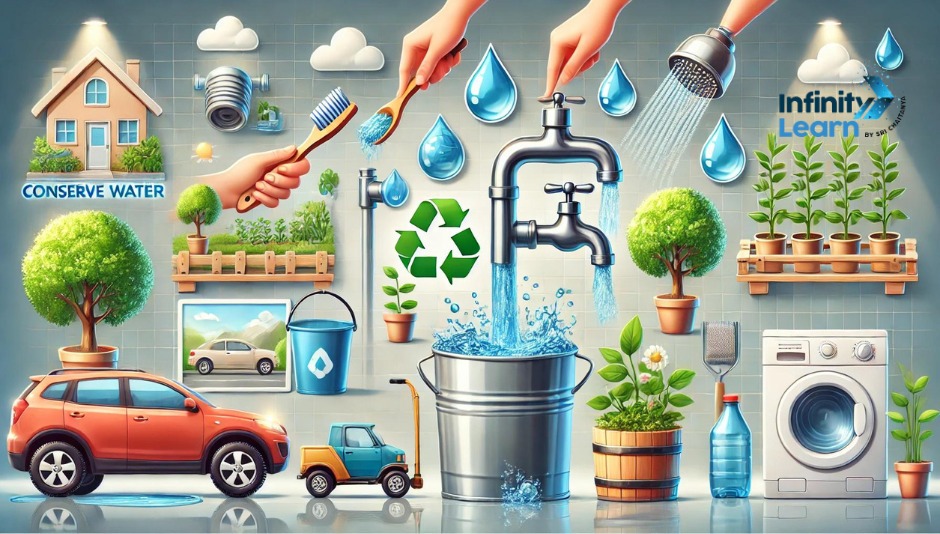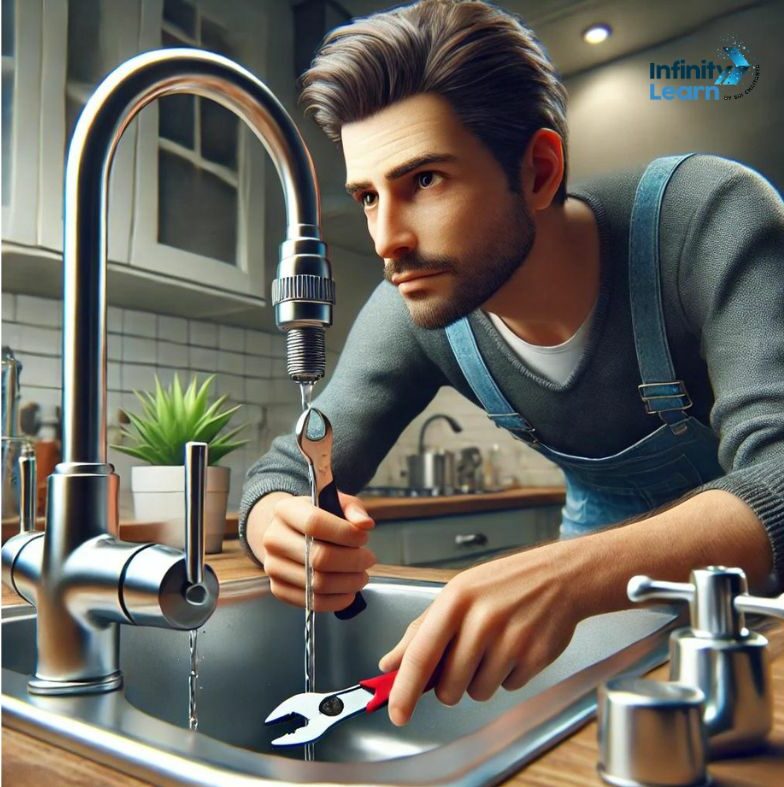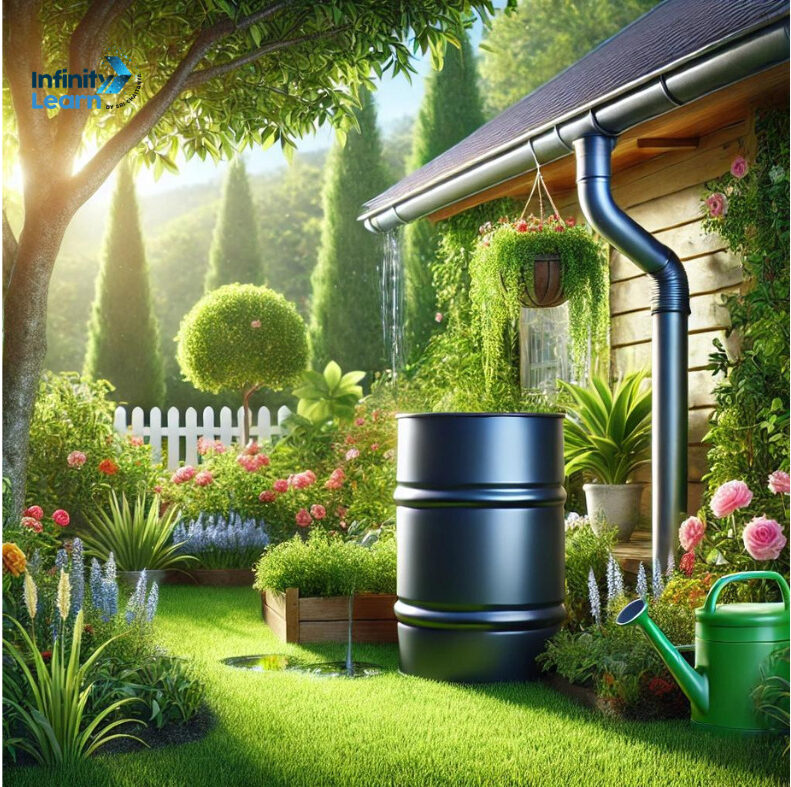Table of Contents
Water is very important for life. We need it for drinking, cooking, cleaning, and many other things we do every day. Unfortunately, in many places, clean water is running out. As more people live on Earth, we use more water, and sometimes we waste it without knowing.
It is essential to suggest ways to conserve water so we can protect this valuable resource. Everyone can help by making small changes in their daily habits. For students, teachers often ask to suggest three ways to conserve water in class discussions. For example, a short answer could be turning off the tap while brushing teeth, fixing leaks, and using a broom instead of a hose to clean driveways.
We can also suggest ways to conserve water in your daily routine, like taking shorter showers and using a bucket for washing cars. Younger students in class 7 and class 8 can think of simple ideas to save water at home and school. By working together and being mindful of how we use water, we can make a big difference for the future.

How Can We Conserve This Precious Resource?
Water is one of our most valuable water resources, essential for life on Earth. It is vital for drinking, cooking, farming, and many other daily activities. However, with growing populations and changing climate, our water supply is under threat. This makes water conservation more important than ever.
Conserving water means using it wisely and reducing waste. Simple actions, like fixing leaks, using water-saving appliances, and being mindful of our usage, can make a big difference. By understanding how to conserve this precious resource, we can help ensure that there is enough clean water for everyone today and for future generations. In this guide, we will explore various effective strategies for water conservation that individuals and communities can adopt to protect this essential resource.
30 Effective Ways to Conserve Water
1. Fix Leaks: Leaking faucets and pipes can waste a significant amount of water. Fix any leaks as soon as you notice them to prevent water wastage.

2. Turn Off the Tap: Turn off the tap while brushing your teeth or washing your hands. This simple habit can save gallons of water each day.
3. Install Water-Saving Showerheads: Water-saving showerheads reduce the amount of water used without compromising on the pressure. They are an easy way to cut down on water use in the shower.
4. Take Shorter Showers: Try to keep your showers under five minutes. This can save a lot of water over time.
5. Use a Bucket for Washing Cars: Instead of using a hose, use a bucket of water to wash your car. This method uses less water and is just as effective.
6. Water Plants in the Morning or Evening: Watering plants during the cooler parts of the day reduces evaporation, ensuring more water reaches the roots.
7. Use a Broom to Clean Driveways: Instead of hosing down driveways and sidewalks, use a broom to clean them. This saves a significant amount of water.
8. Collect Rainwater: Install a rain barrel to collect rainwater. This water can be used for gardening and other outdoor uses.

9. Use a Dishwasher: Modern dishwashers use less water than washing dishes by hand. Make sure to run it only when it’s full to maximize efficiency.
10. Only Run Full Loads of Laundry: Wait until you have a full load of laundry before using the washing machine. This saves both water and energy.
11. Use a High-Efficiency Washing Machine: High-efficiency washing machines use less water and energy. Consider upgrading if your machine is old.
12. Plant Drought-Resistant Plants: Choose plants that require less water for your garden. Drought-resistant plants are a great way to conserve water.
13. Mulch Your Plants: Mulching helps retain moisture in the soil, reducing the need for frequent watering.
14. Use a Pool Cover: If you have a swimming pool, use a cover to reduce evaporation. This helps conserve water and keeps your pool cleaner.
15. Check Your Water Meter: Regularly check your water meter to monitor for any unusual spikes in usage, which could indicate a leak.
16. Educate Your Family: Teach your family members about the importance of water conservation and encourage them to adopt water-saving habits.
17. Install Low-Flow Toilets: Low-flow toilets use less water per flush compared to traditional toilets, making them a great investment for water conservation.
18. Avoid Using the Toilet as a Trash Can: Don’t flush tissues, insects, or other waste down the toilet. Each flush uses a significant amount of water.
19. Use a Watering Can for Plants: Instead of using a hose, use a watering can to water your plants. This method provides better control and reduces water usage.
20. Fix Dripping Faucets: A dripping faucet can waste a lot of water over time. Fix any drips promptly to conserve water.
21. Take a Shower Instead of a Bath: Showers generally use less water than baths. Opt for showers to save water.
22. Turn Off the Tap While Shaving: Turn off the tap while shaving and only use it to rinse. This can save a substantial amount of water.
23. Use a Dual-Flush Toilet: Dual-flush toilets have two flush options: a full flush for solid waste and a half flush for liquid waste. This can significantly reduce water usage.
24. Install Aerators on Faucets: Faucet aerators reduce water flow while maintaining pressure, saving water without sacrificing functionality.
25. Don’t Overwater Your Lawn: Water your lawn only when necessary. Overwatering not only wastes water but can also harm your plants.
26. Use Native Plants: Native plants are adapted to the local climate and require less water and maintenance.
27. Cover Pools and Hot Tubs: Covering pools and hot tubs when not in use reduces evaporation and conserves water.
28. Limit Use of Garbage Disposals: Garbage disposals require water to operate. Use a compost bin instead to dispose of food waste.
29. Use a Timer for Sprinklers: Set a timer for your sprinklers to avoid overwatering your lawn and garden.
30. Educate Others: Share water conservation tips with friends and neighbors to spread awareness and encourage community efforts in conserving water.
Suggest Ways to Conserve Water FAQs
Why is it important to conserve water?
Conserving water is important because it helps protect our natural resources and ensures that everyone has enough water to drink and use. It also saves energy and reduces water bills, making it beneficial for both the environment and our wallets.
What are some simple ways to save water at home?
You can save water at home by fixing leaks, taking shorter showers, and turning off the tap while brushing your teeth. Using a broom instead of a hose to clean driveways and sidewalks is another easy way to conserve water.
How can I save water while gardening?
To save water in your garden, you can use drip irrigation systems that deliver water directly to the roots of plants. Watering early in the morning or late in the evening also reduces evaporation, helping your plants get the moisture they need.
Are there water-saving devices I can use?
Yes, there are several water-saving devices you can use, such as low-flow showerheads, faucet aerators, and dual-flush toilets. These devices help reduce the amount of water used without sacrificing performance.
How can schools and businesses conserve water?
Schools and businesses can conserve water by conducting regular audits to find leaks and using water-efficient fixtures. Educating staff and students about the importance of water conservation can also encourage everyone to use water more wisely.






